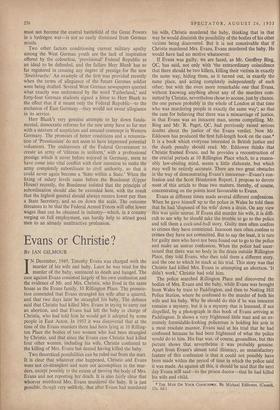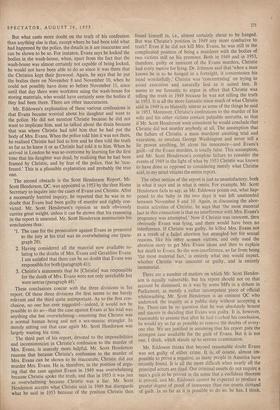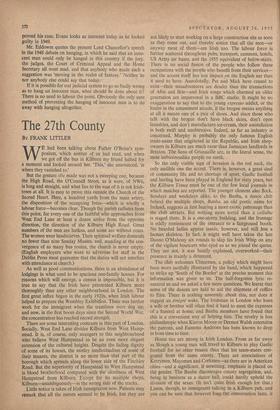Evans or Christie ?
BY IAN GILMOUR IN December, 1949, Timothy Evans was charged with the murder of his wife and baby. Later he was tried for the murder of the baby, sentenced to death and hanged. The case against Evans consisted largely of his own confession and the evidence of Mr. and Mrs. Christie, who lived in the same house as the Evans family, 10 Rillington Place. The prosecu- tion contended that Evans strangled his wife after a quarrel, and that two days later he strangled his baby. The defence said that Christie had killed Mrs. Evans in trying to carry out an abortion, and that Evans had left the baby in charge of Christie, who had told him he would get it adopted by some people in East Acton. In 1953 it was discovered that at the time of the Evans murders there had been lying at 10 Rilling- ton Place the bodies of two women who had .been strangled by. Christie, and that since the Evans case Christie had killed four other women, including his wife. Christie confessed to the killing of Mrs. Evans but denied having killed the baby.
Two theoretical possibilities can be ruled out from the start. It is clear that whatever else happened, Christie and Evans were not co-stranglers and were not accomplices in the mur- ders, except possibly to the extent of moving the body of Mrs. Evans and not reporting her death. It is also fairly clear that whoever murdered Mrs. Evans murdered the baby. It is just possible, though very unlikely, that after Evans had murdered his wife, Christie murdered the baby, thinking that in that way he would diminish the possibility of the bodies of his other victims being discovered. But it is not conceivable that if Christie murdered Mrs. Evans, Evans murdered the baby. He would have had no motive whatsoever.
If Evans was guilty, we are faced, as Mr. Geoffrey Bing, QC, has said, not only with 'the extraordinary coincidence that there should be two killers, killing their victims in exactly the same way, hiding them, as it turned out, in exactly the same place, and acting completely independently of each other; but with the even more remarkable one that Evans, without knowing anything about any of the murders com- mitted by Christie, nevertheless chose to accuse, just by chance, the one person probably in the whole of London at that time who was murdering people in exactly the same way'; so that the case for believing that there was a miscarriage of justice, in that Evans was an innocent man, seems compelling. Mr. Bing and Mr. `R. Paget, QC, had previously raised serious doubts about the justice of the Evans verdict. Now Mr. Eddowes has produced the 'first full-length book on the case.* It is a book which everyone interested in British justice and the death penalty should read. Mr. Eddowes thinks that Christie framed Evans, and he provides a reconstruction of the crucial periods at 10 Rillington Place which, to a reason- ably law-abiding mind, seems a little elaborate, but which may well be entirely accurate. There are two great obstacles in the way of demonstrating Evans's innocence—Evans's con- fession and the Scott Henderson Report. I propose to devote most of this article to these two matters, thereby, of course, concentrating on the points least favourable to Evans-.
Evans at different times made several different confessions. When he gave himself up to the police in. Wales he told them that he had 'disposed of his wife' down a drain. On any view this was quite untrue. If Evans did murder his wife, it is diffi- cult to see why he should take the trouble to go to the police and tell them a cock-and-bull story. Guilty men often confess to crimes they have committed. Innocent men often confess to crimes they have not committed. But to say the least, it is rare for guilty men who have not been found out to go to the police and make an untrue confession. When the police had ascer- tained that there was no body in the drain outside Rillington Place, they told Evans, who then told them a different story, and the one to which he stuck at his trial. This story was that Christie had killed Mrs. Evans in attempting an abortion. `It didn't work,' Christie had told him.
The police searched Rillington Place and discovered the bodies of Mrs. Evans and the baby, while Evans was brought from Wales by train to Paddington, and then to Notting Hill Police Station, where he confessed to the murder of both his wife and his baby. Why he should do this if he was innocent remains a mystery, but it is a mystery that is lessened, if not dispelled, by a photograph in this book of Evans arriving at Paddington. It shows a very frightened little man and an ex- tremely formidable-looking policeman is holding his arm in a most resolute manner. Evans said at his trial that he had confessed because he had been frightened of what the police would do to him. His fear was, of course, groundless, but this picture shows that nevertheless it was probably genuine. Apart from Evans's almost total illiteracy, an unsatisfactory feature of this confession is that it could not possibly have been made within the period of time in which the police said it was made. As against all this, it should be said that the next day Evans still said—to the prison doctor—that he had killed his wife and child.
* THE MAN ON YOUR CONSCIENCE. By Michael Eddowes. (Cassell, 12s. 6d.)
But what casts more doubt on the truth of his confession than anything else is that, except where he had been told what had happened by the police, the details in it are inaccurate and can be shown to be so. For instance, Evans says he locked the bodies in the wash-house, when, apart from the fact that the wash-house was almost certainly not capable of being locked, he would not have been able to do so since it was there that the Christies kept their firewood. Again, he says that he put the bodies there on November 8 and November 10, when he could not possibly have done so before November 11, since until that day there were workmen using the wash-house for storing materials, who would have certainly seen the bodies if they had been there. There are other inaccuracies.
Mr. Eddowes's explanation of these various confessions is that Evans became worried about his daughter and went to the police. He did not mention Christie because he did not want to implicate him, and he talked about the drain because that was where Christie had told him that he had put the body of Mrs. Evans. When the police told him it was not there, he realised Christie had lied to him and he then told the truth so far as he knew it or as Christie had told it to him. When he arrived in London he was so overcome by learning for the first time that his daughter was dead, by realising that he had been framed by Christie, and by fear of the police, that he 'con- fessed.' This is a plausible explanation and probably the true one.
The second obstacle is the Scott Henderson Report. Mr. Scott Henderson, QC, was appointed in 1953 by the then Home Secretary to inquire into the cases of Evans and Christie. After a necessarily hurried inquiry, he reported that he was in no doubt that Evans had been guilty of murder and rightly con- victed. Mr. Scott Henderson's opinion as such obviously carries great weight, unless it can be shown that his reasoning in the report is unsound. Mr. Scott Henderson summarises his conclusions thus : `1. The case for the prosecution against Evans as presented to the jury at his trial was an overwhelming one (para- graph 28); 2. Having considered all the material now available re- lating to the deaths of Mrs. Evans and Geraldine Evans. I am satisfied that there can be no doubt that Evans was responsible for both (paragraph 41); 3. Christie's statements that he [Christie] was responsible for the death of Mrs. Evans were not only unreliable but were untrue (paragraph 48).'
These conclusions concur with the three divisions in his report. Of these three divisions the first seems to me barely relevant and the third quite unimportant. As to the first con- clusion, no one has ever suggested—indeed, it would not be possible to do so—that the case against Evans at his trial was anything else but overwhelming—assuming that Christie was a normal human being and not a sex-maniac strangler. In merely setting out that case again Mr. Scott Henderson was largely wasting his time.
The third part of his report, devoted to the impossibilities and inconsistencies in Christie's confession to the murder of Mrs. Evans, is scarcely more helpful. Mr. Scott Henderson reasons that because Christie's confession to the murder of Mrs. Evans can be shown to be inaccurate, Christie did not murder Mrs. Evans. He is, therefore, in the position of argu- ing that the case against Evans in 1949 was overwhelming because Christie spoke the truth, and that in 1953 it was just as overwhelming because Christie was a liar. Mr. Scott Henderson accepts what Christie said in 1949 but disregards what he said in 1953 because of the position Christie then found himself in, i.e., almost certainly about to be hanged. But was Christie's position in 1949 any more conducive to truth? Even if he did not kill Mrs. Evans, he was still in the complicated position of being a murderer with the bodies of two victims still on his premises. Both in 1949 and in 1953, therefore, guilty or innocent of the Evans murders, Christie had every mptive for lying. Dr. Johnson said that 'when a man knows he is to be hanged in a fortnight, it concentrates his mind wonderfully.' Christie was 'concentrating' on trying to avoid execution and naturally lied as it suited him. It seems to me fantastic to argue in effect that Christie was telling the truth in 1949 because he was not telling the truth in 1953. It is all the more fantastic since much of what Christie said in 1949 is as blatantly untrue as some of the things he said in 1953. Moreover, Christie's confessions to the murder of his wife and his other victims contain palpable untruths, so that if Mr. Scott Henderson were consistent he would conclude that Christie did not murder anybody at all. The assumption that the failure of Christie, a mass murderer awaiting trial and execution, to emulate George Washington and never tell a lie proves anything, let alone his innocence—and Evans's guilt—of the Evans murders, is totally false. This assumption, and Mr. Scott Henderson's complete failure to consider the events of 1949 in the light of what by 1953 Christie was known to have done as opposed to considering merely what Christie said, to my mind vitiates the entire report.
The other section of the report is just as unsatisfactory, both in what it says and in what it omits. For example, Mr. Scott Henderson fails to say, as Mr. Eddowes points out, what hap- pened to the baby in the two days it was left unattended between November 8 and 10. Again, in discussing the abor- tionist activities of Christie, he says that 'the most material fact in this connection is that no interference with Mrs. Evans's pregnancy was attempted.' Now if Christie was innocent, then obviously Evans was lying, and there would have been no interference. If Christie was guilty, he killed Mrs. Evans not as a result of a failed abortion but strangled her for sexual reasons, like his other women victims, and only used the abortion story to get Mrs. Evans alone and then to explain her death to Evans. So the non-interference, so far from being `the most material fact,' is entirely what one would expect, whether Christie was innocent or guilty, and is entirely immaterial.
There are a number i:36 matters on which Mr. Scott Hender- son is equally vulnerable, but his report should not on that account be dismissed, as it was by some MPs in a debate in Parliament, as , merely a rather incompetent piece of official whitewashing. Mr. Scott Henderson is an eminent QC who undertook the inquiry as a public duty 'without accepting a fee. There can be no question that he was absolutely honest and sincere in deciding that Evans was guilty. It is, however, reasonable to assume that after he had reached his conclusion, he would try as far as possible to remove the doubts of every- one else. We are justified in assuming that his report puts the strongest case available for the guilt of Evans. But it is not one, I think, which stands up to serious examination.
Mr. Eddowes thinks that beyond reasonable doubt Evans was not guilty of either crime. It is, of course, almost im- possible to prove a negative, as many people in America have recently found. It is all the more difficult when nearly all the principal actors are dead. Our criminal courts do not require a man's guilt to be proved in the sense that a euclidean theorem is proved, and Mr. Eddowes cannot be expected to produce a greater degree of proof of innocence than our courts demand of guilt. In so far as it is possible to do so, he has, 1 think, proved his case. Evans looks as innocent today as he looked guilty in 1949.
Mr. Eddowes quotes the present Lord Chancellor's speech in the 1948 debate on hanging, in which he said that an inno- cent man could only be hanged in this country if the jury, the judges, the Court of Criminal Appeal and the Home Secretary all went mad, and that anybody who made such a suggestion was 'moving in the realm of fantasy.' Neither he nor anybody else could say that today.
If it is possible for our judicial system to go so badly wrong as to hang an innocent man, what should be done about it? There is no need to labour the point. Obviously the only sure method of preventing the hanging of innocent men is to do away with hanging altogether.




































 Previous page
Previous page